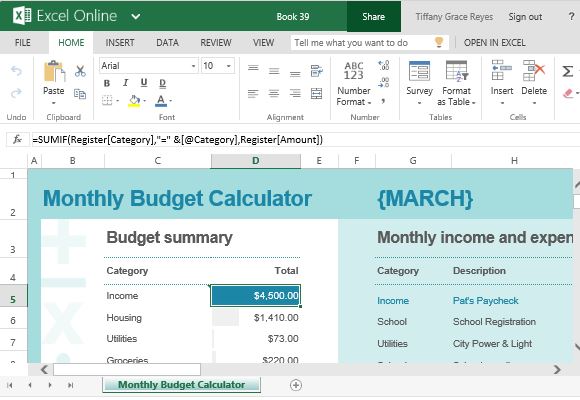
:max_bytes(150000):strip_icc()/GoodBudget-3a7165eb04984063825dd44be62627e6.jpg)

- #Free budget software monthly how to
- #Free budget software monthly registration
- #Free budget software monthly free
If your income changes from month to month, add up your total monthly deposits for the last 3 months and divide that number by 3 to get a monthly estimate.Enter that amount in the budget calculator. If you get paid every other week, multiply your take-home amount by 26 for the number of checks you get each year, and then divide by 12 to get your monthly take-home pay.If you get paid twice a month, add the take-home amount of your two checks together and enter that amount.If you get paid a regular check once a month, simply enter the take-home amount of that check.To determine what to enter under Salary/Wages in the budget calculator: Net income is what you actually bring home after taking out taxes and any paycheck deductions for things like your retirement or your health insurance plan. Gross income is what you make before anything is deducted from your paycheck. This will be the amount you can spend every month, so be sure to use your net income, not your gross income. The first step in the monthly budget calculator is to determine your monthly income.
#Free budget software monthly how to
"emergency fund" a budget item and contribute small amounts monthly until the fund is large enough to serve as aīuild your budget in 4 easy steps Step 1: How to determine and enter your income Your emergency fund should contain enough money to pay your bills for three to six months. You can prepare for the unexpected by creating an emergency fund with sufficient cash to carry you through hard To school, include contributions to funding these goals in your monthly budget.Įmergency Planning: Prepare for the Unexpected For example, rather than fantasize about buying a home or going back You plan to do, you aren\'t likely to do them. If you aren\'t saving money for the things This kind of expense-tracking exercise shows how even little costs addĬreating a budget forces you to reevaluate your goals and priorities. One benefit of building a budget is that it forces you to track your spending and see in black and white (or in Getting this done by doing all the math for you.
#Free budget software monthly free
Quicken\'s Free Budget Calculator gives you a boost toward
#Free budget software monthly registration
Transportation includes not just your car paymentsīut gas, insurance, registration and repairs as well. Or rent as well as utilities when you list an amount for housing. Categorize expenses in groups to make the process simpler.

Take the time to add up your total monthly income from all sources and list your regular monthly expenses to createĪ monthly budget. With Quicken\'s budget calculator, it\'s easier than ever to manage your Indirect costs are the costs of shared resources such as office utilities, telephone, or bookkeeping services that are used by all.When it comes to personal finance, it\'s best not to play the guessing game. They include unique program-related expenses such as the cost of hired vocational coaches, rented books or learning materials on different vocational skills, and the salary of program-specific recruiters. You can also use it as a project budget template.ĭirect costs are straightforward and can be calculated upfront. Use this budget planner to track all the costs (either direct or indirect cost) of the course. Say you’re running a vocational course for low-income young adults. Nonprofit professionals such as you can use this budgeting template to organize and record expenses for a specific program or multiple programs. To help you move from messy finances to organized operational budgeting, we present four free nonprofit budget templates your organization must try. Plus, you’ll be better able to manage operations with the limited funds you receive. But with proper budgeting, you can focus on the financial goal of your nonprofit. If you run a nonprofit organization and don’t keep tabs on your monthly income sources and expenses, you’ll find yourself in a similar situation, either overspending or not spending enough on things that matter. Either way, you’ll end up wasting time and resources. While buying more will throw you off your personal budget, not buying enough will mean extra trips to the supermarket. Chances are you’ll either overbuy or forget something you need. Imagine being on a budget and going to the supermarket without a laundry list of items you need.


 0 kommentar(er)
0 kommentar(er)
